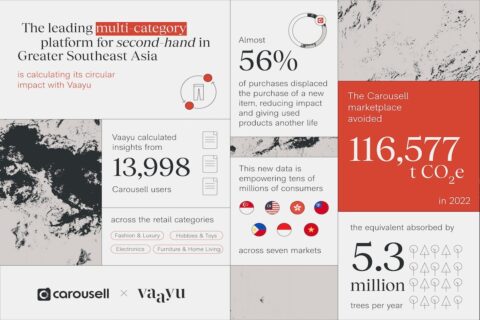
With corporate transparency in the spotlight, one of the world’s leading sports brands has teamed up with influential young content-creators to help its latest sustainability report bridge the generation gap.
To support the release of its 2024 Sustainability Report, global sports company PUMA has partnered with its Voices of a RE:GENERATION — three Gen Z changemakers – to share its challenges and achievements in a way it hopes is more accessible, honest and rooted in the issues young people want to know more about.
Tellingly, a recent global survey by PUMA revealed that more than half of Gen Z consumers, aged 18-27, say brands are not being transparent enough about their environmental impact. In response, PUMA is continuing to double-down on making its sustainability progress more visible and understandable.
Reporting via video and social media

The influential Gen-Z environmentalists have helped target and amplify the messaging in the report via the likes of video and social media content that they have created to reach key demographics.
Key highlights from the report include:
- 87.8% reduction in landfill waste per footwear pair;
- 99% of fabric waste diverted from landfill;
- Carbon reduction progress through science-based targets and renewable energy sourcing; plus
- A 2030 commitment to sourcing only deforestation-free bovine leather.
The three Voices in focus are: US-based upcycler Andrew Burgess; India-based sustainable fashion advocate Aishwarya Sharma; and Germany-based sustainable living creator Luke Jaque-Rodney.
Turning complex reporting into creator-led content, PUMA is rethinking how to communicate climate action and industry accountability to make it relevant to the next generation of climate-conscious consumers.
Messaging matters for consumers
The Voices, who joined PUMA in 2023 to advise on its sustainability strategy, will summarise complex report content and focus on issues that matter most to young audiences, including climate change and circularity.
They offer fresh takes on PUMA’s environmental priorities, while reflecting Gen-Z concerns and expectations.
The messaging matters, explains Kerstin Neuber, Senior Director Corporate Communications at PUMA:
“As a brand, we know that publishing sustainability data isn’t enough. Today’s consumers want clarity, action and accountability and they want it communicated in ways that resonate.
“The Voices will help us share our challenges and achievements in a way that’s accessible, honest and rooted in the issues young people want to know more about.”
Circularity up; and carbon down
In its 2024 sustainability report, PUMA details the tangible process it is making to lower its carbon footprint across both its own operations and supply chain. This includes setting science-based targets, increasing renewable energy use and working closely with suppliers to drive measurable reductions.
The brand is also stepping up its approach to circularity. In 2024, it reduced waste to landfill by 87.8% per footwear pair and diverted 99% of fabric waste from landfill, with the majority reused or recycled.
To address material choices, PUMA has committed to sourcing deforestation-free bovine leather by 2030 and is partnering with the Textile Exchange and cattle farmers in Brazil to support both animal welfare and protect critical forest ecosystems that store vast amounts of carbon.
PUMA is also expanding initiatives like RE:FIBRE, the brand’s textile-to-textile recycling programme, to cut reliance on virgin polyester and lower the environmental footprint of its products and packaging.
PUMA achieved its goal of making 9 out of 10 products from recycled or certified materials and made further progress with its sustainability targets, such as lowering its greenhouse gas emissions. The full report, containing more than 200 pages, was published in late April.
Transparency an issue for Gen-Z
As a result of its Conference of the People event in London in 2022, PUMA made it a priority to be more proactive in communicating its sustainability strategy to younger audiences.
New research commissioned by PUMA shows that more than half (55%) of 18–27-year-old consumers globally believe brands are not being transparent enough about their environmental impact.
Reducing carbon emissions is one of the top priorities for Gen-Z when it comes to responsible production, with one in four (25%) identifying it as a major concern.
PUMA is one of the world’s leading sports brands, designing, developing, selling and marketing footwear, apparel and accessories. The brand offers performance and sport-inspired lifestyle products in categories such as football, running and training, basketball, golf, and motorsports. Headquartered in Herzogenaurach, Germany, PUMA trades in more than 120 countries, and employs some 20,000 people worldwide.
Further Reading:
- More about global sports brand PUMA; and the Voices of a RE:GENERATION;
- More about the Forever. Better. sustainability strategy at PUMA; and its 2024 Sustainability Report;
- More on Instagram from the Voices Andrew Burgess; Aishwarya Sharma; and Luke Jaque-Rodney;
- Also on SustMeme, Winning team scores first for circularity in football;
- Also on SustMeme, Beyond the Label: Transparency not just taglines;
- Also on SustMeme, Resale is a step up for sustainability in fashion;
- Also on SustMeme, Traceability boost for cotton in fashion and textiles;
- Also on SustMeme, Calculating true carbon footprint of the World Cup;
- Also on SustMeme, Cruelty-free vegan sneaker uses cactus, not cows;
- Also on SustMeme, Plastic waste gets Recycled for Radness into eco snow gear;
- Also on SustMeme, Which countries are best for sustainable fashion?
Check out the full archive of stories on the SustMeme Business & Finance Channel, now available to Sponsor.






